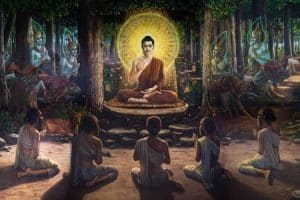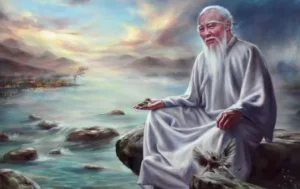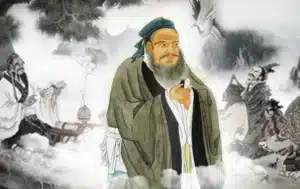In the swirling mists of ancient China, over two millennia ago, Lao Tzu, a sage from the state of Chu, composed a profound text that would become a cornerstone of philosophical wisdom. Known as the “Tao Te Ching”, this compact yet powerful work, consisting of a mere 5,000 characters, offered a path to virtue and peace through understanding the Tao, or “The Way.”
The Tao Te Ching’s enduring relevance is particularly striking in today’s fast-paced and crisis-ridden modernity, where its teachings offer a reservoir of solace and practical solutions. Initially penned for the rulers and nobles of the time, the text was a manual for noble living and governance, yet its audience has since broadened to include anyone in pursuit of wisdom and serenity.
For leaders in the contemporary world, the Tao Te Ching provides a blueprint for leadership that transcends mere authority and power. It advocates for a leadership style that is in harmony with the natural order of the world, one that recognizes and respects the profound needs of people and all living things. Through its pages, leaders are taught to be mindful, humble, and to lead by example rather than force, cultivating an environment where both people and ideas can flourish.
Understand yourself
Understanding yourself is more than a journey of self-discovery; it is a central tenet of leadership as taught by the Tao Te Ching. Lao Tzu, with piercing simplicity, articulates the foundation of true wisdom and strength:
“Knowing others is intelligence; knowing yourself is true wisdom. Mastering others is strength; mastering yourself is true power.”
This ancient advice underscores a profound truth that remains relevant to this day. The battles you face internally are far greater than those you encounter in the outside world, and conquering self is the ultimate victory.
The challenge, however, lies in the human propensity for self-deception. You might often shy away from acknowledging your own shortcomings, a defense mechanism driven by fear and vulnerability. This leads to a pervasive habit of shifting blame, attributing your personal and professional setbacks to external circumstances or other people. Such avoidance is the antithesis of self-mastery and can become a significant barrier to understanding your true self.
Lao Tzu’s counsel is to turn your gaze inward. It is there, in the innermost chambers of your being, that you will engage in the most significant battles. Rather than conforming to external standards and tirelessly chasing external benchmarks of success, the focus should shift to the internal struggle. By conquering the aspects of yourself that hold you back—be it pride, fear, or ignorance—you unlock a form of leadership that is grounded in self-awareness and integrity.
Winning this inner battle demands relentless honesty with yourself. It requires you to strip away the narratives that justify your faults and to face the discomfort of your limitations. This path is not easy; it’s fraught with discomfort and moments of stark realization. Yet, this process is transformative. By engaging in this inner conquest, you emerge not just as a leader who wields authority, but as one who commands respect through the power of example.
As a leader, the pursuit of self-understanding fosters empathy, as you recognize your own flaws mirrored in others. It cultivates resilience, for you know your vulnerabilities and have faced them squarely. And it breeds authenticity, for your actions stem not from a facade of perfection, but from the strength of having confronted and mastered the self.
Wisdom and strength come from humility
The Tao Te Ching speaks of a powerful paradox at the heart of true leadership: to stand above all, one must be humble enough to stay behind. It is through the lens of humility that the ancient text presents the essence of wisdom and strength. Just as the sea is called the king of all rivers because it lies below them, a leader gains their rightful place of respect and authority by assuming a stance of modesty and service.
This principle teaches you that true leadership is not about asserting dominance or flaunting superiority. It’s about embodying humility, not considering yourself above anyone else, and maintaining an eagerness to learn from those around you. When you live humbly, you acknowledge the vast expanse of knowledge that exists and recognize that everyone, no matter their status or role, has something valuable to teach you.
Embracing humility means you have the courage to recognize and accept your limitations. Yet, it’s not about measuring your worth by the success of others, but about striving for personal growth and improvement. Humility in leadership does not suggest weakness or lack of confidence; rather, it’s a reflection of the courage to face the truth of one’s imperfections and the strength to grow beyond them.
By living humbly, you create space for others to contribute, fostering an environment where collective wisdom can flourish. This approach not only uplifts those you lead but also contributes to your own continuous learning and development as a leader. Moreover, humility prevents the kind of hubris that can blind a leader to the realities of a situation, ensuring that decisions are made with clarity and forethought.
The Tao Te Ching’s message is clear: the ultimate victory in leadership, as in life, is not over others, but over oneself. This is achieved not by striving to outshine everyone else, but by cultivating an inner strength that comes from a humble approach to leadership and life. In humility, you find a source of enduring wisdom and a strength that comes from a deep understanding of the human condition—a true mark of a great leader.
Ego does not bring true happiness
The Tao Te Ching offers a compelling perspective on leadership and the role of ego within it. According to Lao Tzu, an effective leader does not need to flex their muscles to show strength, nor do they need to be aggressive to be seen as capable of fighting battles. Instead, a skillful leader places themselves below others, embodying humility and restraint.
From the moment of birth, your ego starts off similar to everyone else’s. As you grow, influenced by your surroundings and education, your ego develops in various directions. It’s your ideals, memories, experiences, and the beliefs that affirm your sense of self, distinct and separate from the rest of the world, responsible for your own actions. Those who live by their ego, who let it grow unchecked, are those whose need to assert themselves becomes ever more pressing.
This is why, through the Tao Te Ching, Lao Tzu cautions against elevating your ego too highly, for doing so can cloud your understanding of who you truly are. Winning against others does not necessarily mean you have conquered yourself. In Lao Tzu’s eyes, true strength isn’t about triumphing over others but rather about overcoming oneself. Thus, instead of focusing on inflating your ego, focus should be on personal growth. This not only brings joy but also a sense of serenity amid the chaos of the world.
This philosophy finds resonance in Buddhism as well, where it’s believed that as the ego enlarges, it leads to more karma and mistakes. The underlying message is that when you allow your ego to take the helm, you are more prone to create ripples of negative impact both in your internal state and in your external world.
For you as a leader, letting go of the ego doesn’t mean you lose your identity; rather, it means you are choosing a path of leadership that is more conscious, considerate, and ultimately more connected to the wellbeing of others. It suggests a shift from leading with authority to leading with influence, from commanding to conversing, and from asserting to understanding. This transformation opens up a space where true happiness can be found, not in the fleeting victories of ego, but in the lasting accomplishments of collective success and personal mastery.
Start with the smallest things
“A journey of a thousand miles begins with a single step.”
Lao Tzu wrote, and these words resonate deeply in the realm of personal and professional development. This isn’t just poetic imagery but practical advice. Success isn’t something that comes overnight, despite what the headlines and sound bites might suggest.
The journey to success is composed of daily efforts, steadfast and gradual. It’s about making incremental improvements, setting your own pace, and not measuring your progress by anyone else’s ruler. As a leader or a team member, the focus should be on advancing a little each day. This is not about grand gestures or sweeping changes, but the modest yet consistent strides you make towards betterment.
You see, when you start with the smallest things, you allow room for growth without overwhelming yourself or your team. This methodical approach means that when mistakes are made, they are manageable and can be rectified without significant setback. Similarly, small victories accumulate over time, building confidence and demonstrating progress.
By setting the example of valuing the small steps, you foster an environment where your team doesn’t feel pressured to achieve unrealistic goals quickly. Instead, they are encouraged to grow steadily, learning and evolving from each minor decision and action. Such a leadership style cultivates a culture of resilience and perseverance, where the focus is on sustainable growth rather than fleeting triumphs.
The lessons contained within the Tao Te Ching are not explicit instructions but rather contemplations that guide the reader to a deeper understanding of balance, the virtue of yielding, and the strength found in stillness—principles that can transform the approach to leadership and management. Its emphasis on self-awareness, simplicity, and the subtle art of influence rather than control can help leaders navigate the complexities of human dynamics and the challenges of organizational life.
It offers a way to lead that is not about the expansion of ego, but about the alignment with a greater order and the pursuit of harmony. In this way, the Tao Te Ching remains a vital touchstone for the leaders of today and tomorrow, a reminder that true power lies in understanding the profound simplicity at the heart of existence.









